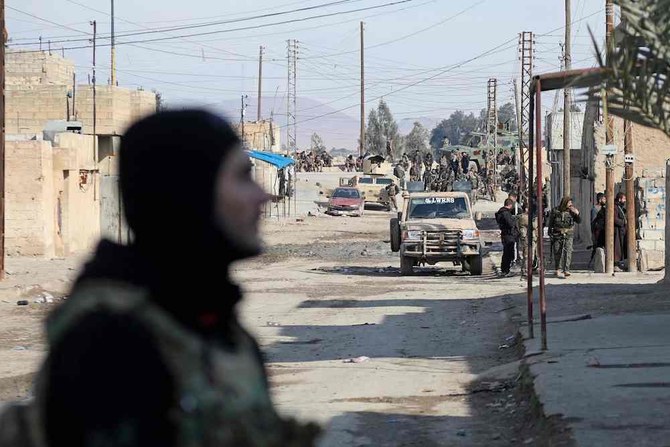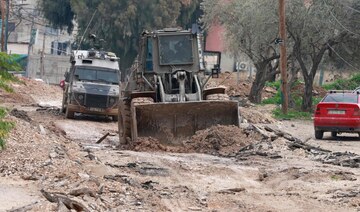JEDDAH: At least 120 people have been killed in ongoing battles between US-backed Kurdish forces and Daesh group fighters after an attack on a Syrian prison, a war monitor said Sunday, as clashes entered a fourth day.
“At least 77 IS members (an acronym used for Daesh) and 39 Kurdish fighters, including internal security forces, prison guards and counter-terrorism forces have been killed” in violence inside and outside the Kurdish-run Ghwayran jail in Hasakeh city since the start of the attack on Thursday, said the Britain-based Syrian Observatory for Human Rights.
At least seven civilians have also been killed in the fighting, according to the monitor.
Battles raged for a third day on Saturday between the militants and Kurdish security forces supported by fighter jets and helicopters from the US-led anti-Daesh coalition.
Daesh fighters armed with heavy machineguns and vehicles rigged with explosives launched an attack on Thursday night targeting Ghwayran prison in the northern city of Hasakeh. The jail housed at least 3,500 Daesh members, including some of its leaders. Hundreds were set free, and the attackers also seized weapons.
Several hundred escaped prisoners were recaptured, but dozens are still on the loose. Kurdish security forces have encircled the prison and are battling to retake full control of surrounding neighborhoods, which the militants have used as a launching pad for attacks.
The Kurdish-led Syrian Democratic Forces said on Saturday that “fierce clashes” had broken out in areas north of Ghwayran, where it killed more than 20 Daesh fighters and seized explosive belts, weapons and artillery.
Kurdish forces raided homes in the flashpoint area near the jail in search of militants while coalition helicopters flew overhead.
The battles have triggered a civilian exodus from neighborhoods around Ghwayran, in the harsh winter cold “Thousands have left their homes near the prison, fleeing to nearby areas where their relatives live,” Kurdish administration official Sheikhmous Ahmed said.
One of the refugees, Abu Anas, fled with his wife and four children. “We don’t know where we are going,” he said. “We have no one but God.”
Daesh has carried out regular “sleeper cell” attacks against Kurdish and Assad regime targets in Syria since the last territorial remnants of its “caliphate” were overrun in March 2019. Most have been against military targets and oil installations in remote areas, but the Hasakeh prison break could mark a new phase.
Analyst Nicholas Heras of the Newlines Institute in Washington said Daesh had targeted the prison to boost its numbers. “It wants to move beyond being the terrorist and criminal network that it has devolved into, and to do that it needs more fighters,” he said. “Prison breaks represent the best opportunity for Daesh to regain its strength in arms, and Ghwayran prison is a nice fat target because it is overcrowded.”
Kurdish authorities have long warned they do not have the capacity to hold the 12,000 Daesh fighters who have been captured, let alone put them on trial.


























